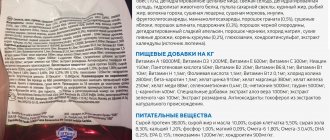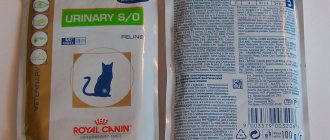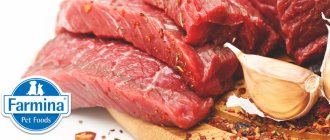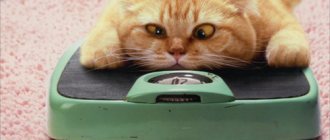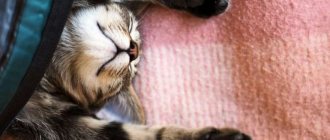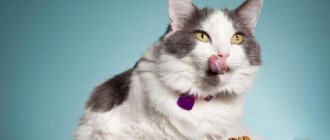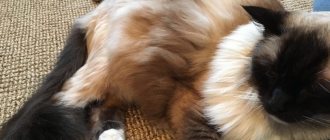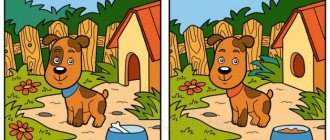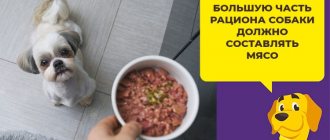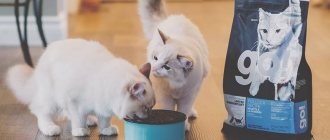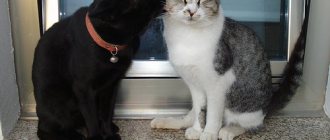You will need to buy Farmina Vet Life cat food if your pet needs to follow a special therapeutic diet. All nutrition is developed jointly with the world's leading experts in the field of veterinary nutrition. The diet belongs to the premium class.
Sort by: ↑ Name Price
FARMINA Vet Life Cardiac 400 g cat food for chronic heart failure 476c
Add to cart
| Pack. | Price |
| 400 g | 476c |
FARMINA Vet Life Diabetic food for cats with diabetes From 455c
More details
| Pack. | Price |
| 400 g | 455c |
| 2 kg | 1873c |
FARMINA Vet Life Gastrointestinal food for cats for diseases of the gastrointestinal tract From 493c
More details
| Pack. | Price |
| 400 g | 493c |
| 2 kg | 1873c |
| 10 kg | 8425c |
FARMINA Vet Life Hairball food for cats, hair removal From 1,074c
More details
| Pack. | Price |
| 2 kg | 1074c |
FARMINA Vet Life Hepatic food for cats with chronic liver failure From 476c
More details
| Pack. | Price |
| 400 g | 476c |
| 2 kg | 1873c |
FARMINA VET LIFE NATURAL DIET CAT GASTROINTESTINAL 85 g canned pate diet for cats for diseases of the gastrointestinal tract 1122c
Add to cart
| Price |
| 1122c |
FARMINA VET LIFE NATURAL DIET CAT STRUVITE 85 g canned pate diet for cats with struvite 1122c
Add to cart
| Price |
| 1122c |
FARMINA Vet Life Neutered Female food for sterilized cats From 387c
More details
| Pack. | Price | ||
| 400 g | 387c | ||
| 2 kg | 1121c | Not available | |
| 5 kg | 2662c | ||
| 10 kg | 5057c | ||
FARMINA Vet Life Neutered Male food for neutered cats From 387c
More details
| Pack. | Price |
| 400 g | 387c |
| 2 kg | 1121c |
| 5 kg | 2662c |
| 10 kg | 5057c |
FARMINA Vet Life Renal food for cats with kidney failure From 406c
More details
| Pack. | Price |
| 400 g | 406c |
| 2 kg | 1873c |
FARMINA Vet Life Struvite Management cat food for recurrent urolithiasis and idiopathic cystitis From 441c
More details
| Pack. | Price |
| 400 g | 441c |
| 2 kg | 1350c |
FARMINA Vet Life Struvite food for cats for struvite type urolithiasis From 441c
More details
| Pack. | Price |
| 400 g | 441c |
| 2 kg | 1592c |
| 10 kg | 7276c |
FARMINA Vet Life UltraHypo food for cats with food allergies or food intolerances From 550c
More details
| Pack. | Price |
| 400 g | 550c |
| 2 kg | 2214c |
FARMINA Vet Life Obesity cat food for weight loss Add to cart Call
Manufacturer
The Italian company Farmina Pet Food is the manufacturer of Vet Life. The story dates back to the middle of the 19th century, when a certain Francesco Russo, having a desire to create feed for farm animals, created Russo Feed.
Initially, it was purely home production: Rousseau involved his own household members in the work, therefore the volumes of the product produced were small and not suitable for a large market. But gradually, becoming convinced that expansion was necessary, one of Francesco’s sons, Angelo, invited the English company Farmina to work (it specialized in the production of food for dogs and cats). The cooperation soon bore fruit: new innovative products and new brands were born.
Over time, partnerships were established with the Neapolitan Department of Animal Nutrition at the Federico II Research University; An independent research department was created, which included several specialists in the field of nutrition and veterinary medicine.
Now, in addition to Italy, there are feed production factories in Brazil and Serbia.
Only natural raw materials from trusted partners are used in production. These raw materials, according to the rules, are suitable for human nutrition, but are not intended for food for commercial reasons. The production technology includes a twin-screw extruder (which increases the digestibility of the product) and a system for adding ingredients in a vacuum (this preserves a maximum of vitamins and minerals).
Strict control is carried out at all stages of production, from the moment of purchasing raw materials to the release of finished feed.
Range
Both dry food and canned food are produced for sale.
Vet Life Hairball is designed to remove hairballs from the stomach of an adult. Ingredients: chicken meat and fat, peas, dehydrated fish, herbs, vegetables, fructooligosaccharides, mannooligosaccharides, brewer's yeast.
Vet Life Neutered Female and Vet Life feline are suitable for sterilized and neutered cats. The ingredients include soybean extract, sugar beet pulp, and whole dehydrated eggs.
Vet Life feline is an option for weakened cats, for those with a weak stomach. This is a dietary food that can be given to cats for inflammatory diseases of the gastrointestinal tract. Contains: fish protein (hydrosylate) and fish oil, calendula extract, rice starch, calcium carbonate, fructooligosaccharides, potassium chloride.
Vet Life Diabetic is the best option for diabetics. Chicken fillet, spelled, oats, fish, eggs, animal fat, pork.
Vet Life Obesity will help your cat lose those extra pounds. The composition is nutritious, but will not allow you to gain fat.
Vet Life Renal and Vet Life Cardiac are approved for use in chronic heart failure to support renal function in renal failure. There is little sodium in the composition, some phosphorus, and a limited amount of protein. Added mannose oligosaccharides based on Saccharomyces cerevisiae extract.
Vet Life Struvite Management is recommended by veterinarians for urolithiasis and cystitis. Added DL-methionine and ammonium chloride.
Vet Life Struvite helps dissolve struvite uroliths. Added calcium sulfate dihydrate and DL-methionine.
Vet Life Gastrointestinal and Vet Life Hepatic are prescribed for chronic kidney failure and stomach problems. It contains easily digestible carbohydrates, a lot of polyunsaturated fatty acids and a dosed amount of protein.
There are also canned goods:
Vet Life Renal - to support kidney function.
Vet Life Struvite - prevention of struvite urolithiasis.
Vet Life Gastrointestinal is a dietary option for individuals who have problems digesting food pieces and absorbing nutrients. There are a lot of electrolytes here.
Vet Life Convalescence - for cats who have suffered a serious illness and require special nutrition.
Farmina Vet Life diet for cats with gastrointestinal indigestion
Farmina Vet Life GastroIntestinal Cat is an easily digestible nutrition thanks to the bioavailability of the ingredients. Recommended for patients with disorders of digestion and absorption in the intestines. It can also be used for diet therapy during the recovery period after intestinal surgery, invasive and infectious diseases.
Characteristics:
• Highly digestible: The quality of the ingredients ensures that the diet is highly digestible.
• Enriched with MOS and FOS: Prebiotics balance intestinal microflora and improve nutrient digestion.
• High content of soluble fiber fraction: The soluble fiber fraction ensures the restoration of normal intestinal motility.
• Omega-3: Essential fatty acids have an anti-inflammatory effect on the intestinal mucosa.
• Vitamins and Electrolytes: Vitamins and electrolytes restore cellular homeostasis after prolonged diarrhea.
Contraindications:
Farmina Vet Life GastroIntestinal Cat is contraindicated in cases of hepatic encephalopathy and lymphangiectasia.
Farmina Vet Life GastroIntestinal Cat is a dietary food for cats, developed for patients with disorders of the processes of digestion and absorption in the intestines. Helps restore digestive processes thanks to the increased content of electrolytes and specially selected ingredients.
Instructions for use:
Use as directed by a veterinarian. Recommended period of use: from 1 to 2 weeks in case of malabsorption in the intestine, from 3 to 12 weeks in case of poor digestive compensation, throughout life in case of chronic pancreatic insufficiency. The required daily amount of feed is indicated in the table. Always leave a clean bowl of fresh water for your cat throughout the day.
Ingredients:
Dehydrated chicken meat, rice, corn, animal fat, corn gluten, flaxseed, hydrolyzed animal proteins, fish meal, sugar beet pulp, fish oil, dehydrated whole eggs, pea fiber, vegetable oil, psyllium seeds, potassium chloride, beer powder yeast, inulin (0.6%), fructooligosaccharides (0.6%), mannanoligosaccharides (0.6%), sodium chloride, sodium phosphate, calcium sulfate. Source of mucilaginous substances: plantain seeds.
Nutrients:
Moisture 8.00%, protein 33.00%, oils and fats 21.50%, fiber 1.70%, ash 6.90% Calcium 1.00%, Phosphorus 0.90%, Sodium 0.50%; Potassium 0.90%, Magnesium 0.09%, Omega-6 3.30%, Omega-3 0.60%, EPA 0.15%, DHA 0.30%. Energy value: 3.994 kcal/kg – 16.7 MJ/kg.
Nutritional supplements per 1 kg:
Vitamin A 22000 IU, Vitamin D3 1500 IU, Vitamin E (alpha tocopherol 91%) 600 mg, Vitamin C 300 mg, Vitamin PP 150 mg, D-pantothenic acid 50 mg, Vitamin B2 20 mg, Vitamin B6 8 mg, Vitamin B1 12 mg; Vitamin K3 (MSB 53%) 1.5 mg, Vitamin H 1.5 mg, Folic acid 1.5 mg, Vitamin B12 0.10 mg, Choline chloride 3000 mg, beta-carotene 1.5 mg, lutein 1.5 mg, zinc oxide 100 mg, zinc sulfate monohydrate 222 mg, manganese sulfate monohydrate 188 mg; iron sulfate monohydrate 44 mg, iron carbonate 60 mg, copper sulfate pentahydrate 48 mg, anhydrous calcium iodate 2.4 mg, cobalt carbonate basic monohydrate 0.54 mg, sodium selenite 33 mg, DL-methionine 7000 mg, taurine 2500 mg; L-carnitine 500 mg. Technological additives: microcrystalline cellulose, antioxidants.
Expiry date: see date on package. Produced 18 months before the expiration date indicated on the package. Store in a cool dry place. 100% Guarantee. Made from high quality ingredients that have passed all benchmark tests.
Country of origin: Serbia, Italy
Manufacturer (factory): Farmina Pet Foods, Russo Mangimi Via nazionale Puglie 80035 Nola
Importer to Belarus: IP Rabynin I. Minsk, Nemanskaya str. 3, room 115
Storage conditions and periods: Date of manufacture, expiration date, batch number, storage conditions are indicated on the packaging.
Compound
- Fresh and dehydrated meat (hydrolysates of chicken, lamb, pork): sources of protein and nutrients;
- Fish and fish products: sources of fat;
- oils and fats (vegetable fats): sources of fatty acids;
- Vegetables, herbs, grains (rice, spelled, beet pulp, oats, rice starch): sources of carbohydrates and fiber;
- Useful plants (calendula, plantain): contain lutein, increase digestibility;
- Antioxidants of natural origin;
- Useful supplements (prebiotics to improve the microflora of the digestive tract; calcium salts and DL-methionine - to control urine pH levels; taurine - for teeth, claws and bones, dried brewer's yeast - a source of protein and B vitamins; Omega-3 and Omega- 6 - fatty acids against inflammatory processes and aging of the body; electrolytes - have a beneficial effect on the functioning of the heart muscle, restore cellular energy metabolism; L-carnitine, L-cystine, L-tryptophan, L-lysine - help build muscle mass; microcrystalline cellulose - gives granules form).
- Vitamins (A - for animal growth; group B - for all internal systems and organs, D3 - makes joints more flexible and bones stronger; E - for vision, hematopoiesis and immunity; C - increases the body's resistance to various types of infections; H - improves condition of the coat and skin; beta-carotene - synthesizes vitamin E; niacin - regulates carbohydrate-white metabolism in cells; selenomethionine - keeps the immune system in good shape and acts as an antioxidant; glucosamine - regulates the functions of the genitourinary system).
Features of Vetlife food
One of the features of Vetlife is that it is only dry food. The products of this brand are designed to promote the health of the animal, and the best specialists and veterinarians of the company work on the recipe. Dry food is more nutritious because moisture does not take up a large part of the composition. All Vet Life therapeutic and preventive foods are complete, and they can become the basis of a cat’s diet.
Indications for use
A cat owner can choose Vet Life to prevent the development of a disease (if the cat is prone to it) or as a therapeutic diet (it is recommended to consult a veterinarian). Indications for use:
- kidney disease, sometimes heart disease (Renal);
- urolithiasis (Struvite);
- exacerbation of urolithiasis, cystitis (Struvite Management);
- diseases of the cardiovascular system (Cardiac);
- liver failure (Hepatic);
- food allergies, intolerance to specific foods (UltraHypo);
- obesity, tendency to gain weight (Obesity);
- castration (Neutered Male) and sterilization (Neutered Female);
- gastrointestinal diseases, postoperative period, etc. (Gastrointestinal);
- diabetes mellitus (Diabetic);
- long wool (Hairball).
Some owners choose medicinal/preventive food “at their own discretion”. For example, in my building there lives a woman who bought Urinari food for her cat. When I asked her what the animal’s diagnosis was, she replied that he was urinating. The woman did not go to the vet because she decided that the cat had weak kidneys. At the store she asked for “kidney food.” After some time, she still had to go to the veterinary clinic. And there they made a diagnosis - the cat was simply in heat, and he was not urinating, but marking; does not writhe in pain - but calls for the female. This could have harmed the cat, but everything turned out okay.
You cannot try to independently determine the diagnosis of a cat; only a specialist can prescribe therapeutic or preventive food
Composition of Vetlife food
Feed manufacturer Vet Life claims that all raw materials for production are delivered from Italy. Moreover, factories operate in such a way that natural raw materials do not lose their quality. Feed is produced only upon order from distributors, and not in advance, so the products do not sit in warehouses, which means they do not have time to spoil. Main ingredients of Vet Life food:
- protein sources (hydrolysates of fish, chicken, lamb or pork, eggs, corn gluten, dehydrated chicken);
- fats and oils of vegetable origin (essential fatty acids contained in animal or fish oil are easier to digest);
- sources of carbohydrates (rice starch, rice, corn, spelled, oats);
- sources of fiber - sugar beet pulp (removes wool from the gastrointestinal tract), pea fiber (provides a feeling of satiety);
- plantain and/or calendula extracts (source of lutein);
- antioxidants - extracts of natural tocopherols (protecting the body from free radicals)
- vitamins, minerals and other supplements.
Some cat owners are confused by the fact that the composition does not contain, for example, fresh chicken fillet, but hydrolyzate. Many people imagine offal, production waste or a synthetic analogue of meat, but this is not so. Most veterinarians also advise choosing foods that contain fresh meat. I consulted with a veterinarian when I switched one of my cats to commercial food. He explained to me that hydrolyzate is something like broth, a product of meat processing using hydrolysis (and this can be the processing of fresh meat or offal), and dehydrated means “dehydrated.”
Cat owners may also be confused by the spelled content in their food. Spelled (Triticum spelta) is a type of wheat with chaffy ears. It is believed that most grains are used in feed production to reduce the cost of production, but premium and super-premium feeds do not imply 100% meat content. And spelled, unlike more common types of cereals, is popular due to its property of not accumulating harmful substances in the grains. By the way, spelled is often consumed by people seeking a healthy diet or as part of diets.
Most of the composition is occupied by meat components processed in various ways, cereals, sugar beets and peas.
The following components are used as useful additives in Vet Life food:
- plantain extract (increases digestibility);
- prebiotics FOS and MOS (improve the microflora of the digestive tract);
- DL-methionine and calcium salts (provide control over urine pH levels);
- taurine (allows you to control the body's resistance to insulin and has a positive effect on heart function);
- dry brewer's yeast (the yeast Saccharomyces cerevisiae is rich in B vitamins and protein);
- Omega-3 and Omega-6 fatty acids (help relieve inflammation in the digestive tract);
- calcium salts (pH control), potassium, sodium (maintaining osmotic pressure of cells);
- electrolytes (help restore cellular energy metabolism after diarrhea, improve heart function);
- phytoestrogens (soy isoflavones improve metabolism and normalize hormonal levels);
- acids EPA and DHA (immunocorrectors), pantothenic and folic acids;
- ammonium chloride (regulates the acidity of dry food);
- microcrystalline cellulose (complex carbohydrates allow you to fill the food with fiber and give it the shape of granules);
- L-lysine, L-tryptophan, L-cystine and L-carnitine (promotes muscle growth and fat breakdown).
EPA and DHA are amino acids (eicosapentaenoic and docosahexaenoic). The first is found in fish, fish oil and grass-fed meat. Substances that are formed due to EPA have anti-inflammatory properties. The second acid is found in the same products, but also in milk. DHA improves brain activity and has a positive effect on vision. In addition, this acid can reduce the risks of many diseases (heart attack, diabetes, arthritis, etc.).
Folic acid was discovered at the beginning of the 20th century. The body can produce it on its own, but a lack of this substance can lead to decreased immunity and health problems. It is found in large quantities in yeast, legumes and cereals, liver, etc. However, excess folic acid also leads to disorders (decreased antiviral and antitumor immunity), so it is contained in minute quantities in animal feed. The group “folic acid” also includes its derivatives.
The additives contained in Vet Life food are needed not only to maintain the quality of the product, but also to enrich the food with beneficial properties
In addition to the listed ingredients, the manufacturer claims that Vet Life food contains the following vitamins:
- vitamin A is necessary for the growth and development of the cat, the health of the coat and skin, as well as vision;
- vitamins B, B1, B2, B6, B12 (have a positive effect on the functioning of all organs and systems);
- vitamin D3 (strengthens bones and joints);
- vitamin E (strengthens the cat’s antifungal immunity, is good for vision and hematopoiesis);
- vitamin C (increases the body's resistance to chronic diseases);
- vitamin H (improves metabolism, appearance of coat and skin);
- niacin (regulates carbohydrate-fat metabolism in cells);
- beta-carotene (needed for the synthesis of vitamin A);
- selenomethionine (functions as an antioxidant and stimulates the immune system);
- glucosamine (protects the bladder mucosa from toxins, relieves pain, regulates the functioning of the genitourinary system).
Class affiliation
Farmina does not classify Vetlife food as a specific class, but veterinarians characterize these products as premium diets. Some experienced cat owners believe that Vet Life is closer to the super premium class. The fact is that this dry food contains up to 50% protein (in economy food - up to 30% protein, in premium food - up to 35%). In addition, the detailed composition of Vetlife states that it contains a good vitamin and mineral supplement, and does not include cheap processed meat products (offal, meat and bone meal, etc.). Although said dehydrated chicken may be chicken meal. Vet Life is not advertised, unlike budget and premium foods.
Another feature that speaks to the class of the food is the absence of synthetic antioxidants. Vet Life is also non-GMO. In fact, the European Union allows small amounts of genetically modified organisms in cat diets, but Farmina fundamentally refuses questionable ingredients (for example, corn). The spelled and oats contained in the diets do not contain GMOs.
In addition, the phosphorus-calcium balance also indicates the high quality of the feed. The veterinary clinic said that according to AAFCO standards, calcium and phosphorus should be contained in a ratio of 1.2 to 1 (if calcium is 1.2%, then phosphorus should be no more than 1%). In Vet Life food, this balance is disturbed by only 0.1–0.01%.
Most of the symbols on the packaging of Vetlife food are in English, but the main signs are already clear (Natural ingredients, P, Ca, etc.)
Where to buy and approximate cost
Vetlife food cannot be bought in a regular supermarket. Veterinary food in this line can be found in a specialized store or ordered in an online store. There are representative stores in large Russian cities (Ekaterinburg, Krasnodar, Moscow, St. Petersburg, etc.). The price depends on the store itself, the size of the package and the type of food. So bags of 400 g can cost from 277 to 479 rubles. Packages of 2 kg cost from 930 to 2229 rubles, and 10 kg bags can cost up to 4985 rubles.
Large bags and sacks of dry food are much more profitable than small packages. However, in this case you need to be sure that this food is suitable for your cat. The disadvantage of large packages is that the food may deteriorate (for example, the expiration date will pass, or the product will deteriorate due to violation of storage conditions). Recommendations for storing and consuming food are on the back of any package. When I have to buy a big pack of food, I don't keep these crickets in their original packaging. I pour the food into a plastic sealed container and store it in the dark in a cabinet. The fact is that dry food tends to “dissipate”, and my older cat is a gourmet (she does not eat dry food without odor).
The cat owner can choose a better offer on Yandex Market
Advantages and disadvantages
- The manufacturer uses only natural, tocopherol-rich antioxidants: ascorbic acid, hydroxytyrosol, citrine, vitamin A. Without these components, it will not be possible to keep the food tasty and healthy; in addition, it has been proven that antioxidants have a beneficial effect on animals and eliminate the damage caused by free radicals , slow down cell aging. Artificially produced butylated hydroxyanisole and butylated hydroxytoluene only cause harm to the animal body.
- The granules are produced in special packaging designed for long-term storage of the product: oxygen-free, able to protect the pieces from rancidity, preserve their taste and fresh appearance.
- The feed does not contain GMOs (certified raw materials are purchased), there are no antibiotics or other medications, growth hormones, flavor enhancers, coloring agents, etc.
- Modern technologies make it possible to create the most useful product possible, preserving almost all nutrients, vitamins and minerals.
- Corn is not used - a strong allergen that causes gastrointestinal problems, diabetes and obesity.
- According to published studies, food from this brand significantly improves the quality of life of cats with pathologies and serious diseases (urolithiasis, chronic renal failure).
- They contain a good vitamin and mineral supplement that does not require adding separate complexes to food.
- These foods are sold in many pet stores, and you can also order them online without any problems.
- The presence in some foods of corn gluten - a vegetable protein from corn that remains after the production of corn starch. Like whole corn, gluten can cause allergies and a number of diseases. There is also the presence of soy, which is difficult to digest.
- The percentage of the main components is not specified. This causes bewilderment - why is such important information hidden and is the amount used sufficient for the full development of a living being?
- Price. Veterinary food is generally not cheap, but Italian food is more expensive than many.
The phosphorus-potassium balance is not ideal, but the deviation is small: only 0.1-0.01%.
Get to know interesting cat breeds with the help of our encyclopedia: Ojos Azules, Ragdoll, Persian.
Description and composition
Vet Life cat food contains only healthy and natural ingredients that ensure the normal functioning of the pet’s body. In a cat food recipe, the first 5-7 components are the main ones, and the rest perform an auxiliary function. Thus, Vet Life food manufacturers use the following ingredients to make their products:
- dried chicken;
- animal fat;
- rice cereal;
- corn gluten;
- flax seeds;
- spelt;
- protein hydrolysate.
Other components in the dry food structure are fish oil, extracted sugar beet chaff, dried fish and whole eggs, food additive E508, pea fiber and plantain seeds. Vet Life also contains substances such as:
The finished product also contains not very healthy ingredients, for example, sodium phosphate.
- inulin;
- dry yeast;
- organophosphorus compounds;
- marigold extract;
- food additive E339;
- calcium salt of sulfuric acid.
It includes the structure of the Vet Life food and vitamins, which, in combination with other ingredients, ensure normal digestion for the cat and generally have a positive effect on its health.
